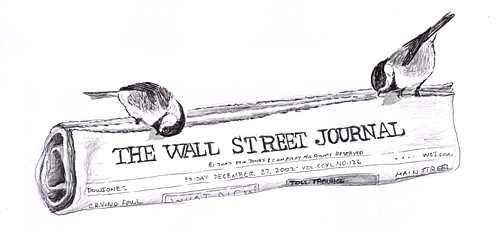
Dear Bird Folks:
A recent article in the Wall Street Journal said that feeding birds can be doing the birds more harm than good and that it maybe a bad thing for the environment. Do you think feeding birds is really a bad thing?
-Don and Ursula, Brewster
Yeah Kids,
I read that article too. I’ll be glad to answer your question, but you should keep in mind that I’m answering it from the point of view of a guy who sells over a ton of bird seed everyday of the year. So it is doubtful that you’ll find any part of me that is against bird feeding, except of course my sore back.
For those of you who, for some reason, didn’t get your copy of the Journal that day, let me try to sum up what that front page story was about. The headlines read: “Feeding Wild Birds May Harm Them and the Environment.” Whoa, pretty scary stuff. I’ll bet a wave of bird haters out there (mostly people who have nicely polished cars) screamed, “I knew it, Aunt Ethel’s bird feeder is ruining the earth. If she takes it down we’ll all be saved.”
The lengthy story went on to mention a number of issues that most of us have been asking for years. Does feeding birds upset the natural balance? Does bird feeding promote one species of bird at the expense of another? Does causing birds to feed together increase the risk of spreading diseases? Do feeders bring birds too close to our homes where birds can fall victims to cats, hawks and windows? All of these are worthwhile questions that I would love to know the long-term answers to. Unfortunately, none of the questions were answered or even addressed in the story.
The Wall Street Journal article, like many newspaper articles, was designed to push a few hot topic buttons, without offering any true insight or drawing any legitimate conclusions. This column was all classic in that regard. It offered many questions and zero answers.
I don’t think the point of the WSJ article was to suggest that bird feeding is a great ecological problem. If the environment was their concern they would be writing about the toxic newsprint paper mills instead of bird feeders. I think they were suggesting that there is some irony with feeding birds. People, who truly care about our native birds, sometimes create a problem while they think they are helping.
I agree with them on this point. I have some customers who do things that make me cringe. Some let their cats outside, some never clean their feeders and some refuse to move their feeders away from their windows, no matter how many birds hit the glass. People aren’t perfect and we all could do a better job at everything we do. But putting out a bird feeder is a zillion times environmentally less damaging than driving a car to purchase the feeder.
Everything that us humans do has an effect on birds and all other creatures. Some of the effects are good, many are not. If we stop using feeders, our lawns are still going to attract robins, our berry bushes are still going to attract waxwings and bluebirds and our brush piles are still going attract wrens. I can’t wait for the Journal’s anti-brush pile expose.
There is no reason to take in your feeder. There are thousands of things much more environmentally upsetting than a bird feeder could be. And believe me, if there ever is a problem with feeding birds, you’ll read about it here or in a bulletin issued by Cornell’s Laboratory of Ornithology, which has already debunked the Journal’s report. Reliable bird news won’t be found in a financial publication. The Wall Street Journal is best used if want some economic advice or when you need something to clean your feeders with.